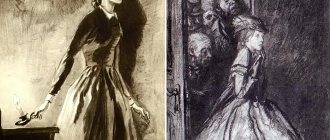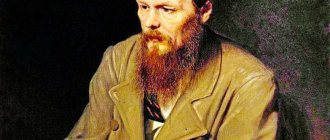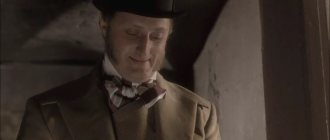- Essays
- On literature
- Dostoevsky
- The image of the eternal Sonechka in the novel Crime and Punishment
Sonya Marmeladova is one of the main characters in the novel by F.M. Dostoevsky "Crime and Punishment".
Seventeen-year-old Sonya suffered a difficult fate: her mother died prematurely, which is why her father married another woman, with his children. Meek, humble, sacrificial, she decides to take a terrible step for the sake of her family, to save her from death by starvation - sacrificing her innocence and honor, she goes to the panel. Her decision is a result of the conditions in which she had to live. At the same time, it is a lifeline for the dying members of her family. The only thing the girl has is her body, with the help of which she decides to save the Marmeladov family from starvation. But it was Sonechka’s choice, her decision; she did not feel resentment, evil, or hatred towards her stepmother. That is why the soul of the young girl did not harden, did not become bitter, was not filled with anger and hatred towards others, her soul was crystal clear.
Sonya is saved by her love for people; she devotes her whole life to selfless and endless sacrifice. This is the meaning of Sonechka Marmeladova’s life, her happiness, her joy. It’s as if she feeds herself, her soul, with love for people, this gives her the strength to move on, to humbly endure all the torment and suffering. But the shame pushed the girl to thoughts of suicide, because in this way, in her opinion, she could wash away dishonor, humiliation, and shame. However, thoughts about the hungry children she could feed forced the girl to accept her fate.
The young woman is distinguished by her ability to understand and accept the pain of other people, to empathize with them. So, for example, she accepted Raskolnikov’s confession about the murder he committed without condemnation, disgust or disgust. With her characteristic humility and meekness, Sonya convinces Rodion to confess and repent of his crime. The girl does not push Raskolnikov away from her, but, on the contrary, sympathizes with him and strives to cleanse his soul. This behavior and Sonechka’s love are resurrected into the life of a young man. It was this love that helped Sonya realize that, despite Raskolnikov’s pride, he was humiliated, dejected and needed help, support, warm words of consolation, as well as firm words of guidance on the true path. A young girl goes to hard labor for a young guy. This sacrifice, her immeasurable, selfless love helps to cleanse herself of the shameful imprint left by the past.
Dostoevsky’s ideal is a warm-hearted, open, loving person with high moral qualities, which is revealed in the image of Sonya Marmeladova. The girl, as commanded by Jesus Christ, in whom she believes, “brings light to the world,” brings hope, compassion, meekness. And, according to Fyodor Mikhailovich Dostoevsky, every person should be like this.
- Author: F. M. Dostoevsky
- Work: Crime and Punishment
- This essay has been copied 23,887 times
In the novel “Crime and Punishment,” F. M. Dostoevsky showed the tragedy of an individual who sees many of the contradictions of his era and, completely confused in life, creates a theory that goes against the main human laws. Raskolnikov's idea that there are people - “trembling creatures” and “having the right”, finds many refutations in the novel. And, perhaps, the most striking revelation of this idea is the image of Sonechka Marmeladova.
It was this heroine who was destined to share the depth of all the mental anguish Raskolnikov experienced after the murder of the old money-lender and Lizaveta. It was Sonya who was constantly next to Raskolnikov, helping him understand himself and come to those eternal values that the poor and resigned girl personified in her character.
The meaning of Sonechka’s life is compassion for people, compassion for all living things. It does not divide people into good and evil. For her, any person is good. Sonya has a great power of compassion, and this power forces her to go through all the circles of hell, pushes her towards the same “humiliated and insulted” people as herself. Raskolnikov calls people like Sonya “poor and meek” who “give everything, look meekly and quietly.” But it is precisely this quality that makes Sonya capable of strong actions that require great moral courage from a person.
Sonya is not thinking about herself. All her thoughts are directed to her drunken father, sick stepmother and small children. Fear for them, for their future, pushes Sonya onto the path of a prostitute. If these unfortunate people had not existed, she would not have allowed herself to sink so low; most likely she would have committed suicide. But she always remembers her family.
If Raskolnikov’s suffering leads him to separation from people, then Sonya’s suffering leads him to unity with humanity. Therefore, for Raskolnikov, Sonya becomes a symbol of eternal sacrifice, a symbol of the soul trampled under foot by this cruel world. But Sonya believes in a certain deep meaning of life, the original meaning of human existence in general. By committing murder, Raskolnikov suppressed the feeling of fullness of life, suppressed the desire to live. And Sonya lives with this feeling constantly, although she herself is in the terrible abused position of a prostitute.
Raskolnikov goes on a rebellion against the merciless and cruel world, wants to get rid of violence by committing other violence, and this leads to the suppression of a person, his personality (it is no coincidence that, together with the old woman, he kills Lizaveta, the same unfortunate and downtrodden soul as Sonya). Sonya cannot always understand the great meaning of existence, but she feels it with her heart, bows before it and intuitively follows the eternal Christian and human laws. She denies the right of a person to commit lynching, so the very idea of dividing people into two categories seems blasphemous to her.
Raskolnikov often tries to identify Sonechka with himself. In his opinion, she also stepped over human laws by going outside. There is a significant difference between the desire for good by allowing evil in relation to other people and voluntary, natural self-sacrifice committed in the name of love for one's neighbor. In Sonya’s understanding, a person cannot step over another person, only through himself, through his suffering.
But Sonya’s dedication is far from humility; it is active in nature and aimed at helping loved ones. This is a very religious girl, but her religiosity is far from the ritual side of the Christian faith. She does not serve a prayer service, does not ask priests for advice, and does not turn to miraculous icons. She just believes. In the person of Sonya, Dostoevsky showed the people's version of the religious worldview, which is much more sincere and comes from the heart.
Sonina’s love for humanity is free from any theoretical justification; this is her natural state. She loves people because her heart tells her so. Sonya Marmeladova becomes the ideal of a woman, the ideal of a person. Therefore, she defeats Raskolnikov and finally debunks his theory. Sonya follows him to hard labor, where she helps Rodion to the end to take the path of repentance and purification, turns him to the true faith, to philanthropy without violence.
Check out these essays
- The image of Sonya Marmeladova in the novel “Crime and Punishment” Sonya Marmeladova is the heroine of Fyodor Mikhailovich Dostoevsky’s novel “Crime and Punishment”. Poverty and an extremely hopeless family situation force this young girl to earn money from the panel. The reader first learns about Sonya from the story addressed to Raskolnikov by the former titular adviser Marmeladov, her father. Alcoholic Semyon Zakharovich Marmeladov vegetates with his wife Katerina Ivanovna and three small children - his wife and children are starving, Marmeladov drinks. Sonya, his daughter from his first marriage, lives on […]
- Rodion Raskolnikov and Sonya Marmeladova in the novel “Crime and Punishment” Impoverished and degraded student Rodion Romanovich Raskolnikov is the central character of Fyodor Mikhailovich Dostoevsky’s epoch-making novel “Crime and Punishment.” The author needs the image of Sonya Marmeladova to create a moral counterbalance to Raskolnikov’s theory. Young heroes are in a critical life situation when they need to make a decision on how to live further. From the very beginning of the story, Raskolnikov behaves strangely: he is suspicious and anxious. In the sinister plan of Rodion Romanovich, the reader […]
- Raskolnikov's confession of a crime (essay) The novel by F. M. Dostoevsky is called “Crime and Punishment.” Indeed, it contains a crime - the murder of an old pawnbroker, and a punishment - trial and hard labor. However, for Dostoevsky, the main thing was the philosophical, moral trial of Raskolnikov and his inhuman theory. Raskolnikov's recognition is not completely connected with the debunking of the very idea of the possibility of violence in the name of the good of humanity. Repentance comes to the hero only after his communication with Sonya. But what then makes Raskolnikov go to the police […]
- Raskolnikov's theory and its refutation in Dostoevsky's novel Crime and Punishment Former student Rodion Romanovich Raskolnikov is the main character of Crime and Punishment, one of the most famous novels by Fyodor Mikhailovich Dostoevsky. The name of this character tells the reader a lot: Rodion Romanovich is a man with a split consciousness. He invents his own theory of dividing people into two “categories” - “higher” and “trembling creatures”. Raskolnikov describes this theory in the newspaper article “On Crime.” According to the article, “superiors” are given the right to transgress moral laws and in the name of […]
- Contradictions of Raskolnikov's theory (essay) The hero of F. M. Dostoevsky's novel “Crime and Punishment” is a poor student Rodion Raskolnikov, forced to make ends meet and therefore hates the powerful because they trample on weak people and humiliate their dignity. Raskolnikov is very sensitive to the grief of others, tries to somehow help the poor, but at the same time understands that he is not in his power to change anything. In his suffering and exhausted brain, a theory arises according to which all people are divided into “ordinary” and “extraordinary”. […]
- The moral ideal in Dostoevsky’s work “Crime and Punishment” “Beauty will save the world,” wrote F. M. Dostoevsky in his novel “The Idiot.” Dostoevsky searched for this beauty, which is capable of saving and transforming the world, throughout his entire creative life, therefore, in almost every of his novels there is a hero in whom at least a piece of this beauty is contained. Moreover, the writer did not mean the external beauty of a person, but his moral qualities, which turn him into a truly wonderful person, who with his kindness and philanthropy is able to bring a piece of light […]
- The theme of the “little man” in Dostoevsky’s novel “Crime and Punishment” The theme of the “little man” is one of the central themes in Russian literature. Pushkin (“The Bronze Horseman”), Tolstoy, and Chekhov touched on it in their works. Continuing the traditions of Russian literature, especially Gogol, Dostoevsky writes with pain and love about the “little man” living in a cold and cruel world. The writer himself noted: “We all came out of Gogol’s “The Overcoat.” The theme of the “little man”, “humiliated and insulted” was especially strong in Dostoevsky’s novel “Crime and Punishment”. One […]
- The theme of the fall and spiritual rebirth of man in Dostoevsky’s novel “Crime and Punishment” The human soul, its suffering and torment, pangs of conscience, moral decline, and the spiritual rebirth of man have always interested F. M. Dostoevsky. In his works there are many characters endowed with a truly reverent and sensitive heart, people who are kind by nature, but for one reason or another find themselves at the moral bottom, have lost respect for themselves as individuals, or have lowered their soul morally. Some of these heroes never rise to the same level, but become real […]
- Reasons for Raskolnikov’s crime At the center of F. M. Dostoevsky’s novel “Crime and Punishment” is the character of the hero of the 60s. XIX century, commoner, poor student Rodion Raskolnikov. Raskolnikov commits a crime: he kills the old money-lender and her sister, the harmless, simple-minded Lizaveta. Murder is a terrible crime, but the reader does not perceive Raskolnikov as a negative hero; he appears as a tragic hero. Dostoevsky endowed his hero with beautiful features: Raskolnikov was “remarkably good-looking, […]
- The image of Rodion Raskolnikov in the novel “Crime and Punishment” In the world famous novel “Crime and Punishment” by Fyodor Mikhailovich Dostoevsky, the image of Rodion Raskolnikov is central. The reader perceives what is happening precisely from the point of view of this character - an impoverished and degraded student. Already in the first pages of the book, Rodion Romanovich behaves strangely: he is suspicious and anxious. He perceives small, completely insignificant, seemingly incidents very painfully. For example, on the street he is frightened by attention to his hat - and Raskolnikov is here […]
- The meaning of the image of Sonya Marmeladova in the novel “Crime and Punishment” Sonya Marmeladova for Dostoevsky is the same as Tatyana Larina for Pushkin. We see the author's love for his heroine everywhere. We see how he admires her, speaks to God and in some cases even protects her from misfortune, no matter how strange it sounds. Sonya is a symbol, a divine ideal, a sacrifice in the name of saving humanity. She is like a guiding thread, like a moral example, despite her occupation. Sonya Marmeladova is the antagonist of Raskolnikov. And if we divide the heroes into positive and negative, then Raskolnikov will be [...]
- Comparative characteristics of “Raskolnikov and Luzhin” (table) Raskolnikov Luzhin Age 23 years old About 45 years old Occupation Former student, dropped out due to inability to pay Successful lawyer, court advisor. Appearance Very handsome, dark brown hair, dark eyes, slender and thin, above average height. He dressed extremely poorly, the author points out that another person would even be ashamed to go out into the street dressed like that. Not young, dignified and prim. There is a constant expression of grumpiness on his face. Dark sideburns, curled hair. The face is fresh and [...]
- Three fights between Raskolnikov and Porfiry Petrovich Porfiry Petrovich is a bailiff of investigative cases, a distant relative of Razumikhin. This is a smart, cunning, insightful, ironic, extraordinary person. Raskolnikov’s three meetings with the investigator are a kind of psychological duel. Porfiry Petrovich has no evidence against Raskolnikov, but he is convinced that he is a criminal, and he sees his task as an investigator either in finding evidence or in his confession. This is how Porfiry Petrovich describes his communication with the criminal: “Did you see the butterfly in front of the candle? Well, he's all [...]
- Raskolnikov's doubles and their role in the novel "Crime and Punishment" Dostoevsky's novel "Crime and Punishment" can be read and reread several times and always find something new in it. Reading it for the first time, we follow the development of the plot and ask questions about the correctness of Raskolnikov’s theory, about Saint Sonechka Marmeladova and about the “cunning” of Porfiry Petrovich. However, if we open the novel a second time, other questions arise. For example, why the author introduces certain characters and not others into the narrative, and what role they play in this whole story. This role is for the first time [...]
- The beauty of human action “Crime and Punishment” F. M. Dostoevsky was a true humanist writer. Pain for man and humanity, compassion for violated human dignity, the desire to help people are constantly present on the pages of his novel. The heroes of Dostoevsky's novels are people who want to find a way out of the impasse in life in which they find themselves for various reasons. They are forced to live in a cruel world that enslaves their minds and hearts, forcing them to act and act in ways that people would not like, or would not act in other […]
- Raskolnikov's spiritual quest. The origins of the rebellion. In the center of F. M. Dostoevsky’s novel “Crime and Punishment” is the character of the hero of the sixties of the nineteenth century, commoner, poor student Rodion Raskolnikov. Raskolnikov commits a crime: he kills an old pawnbroker and her sister, the harmless, simple-minded Lizaveta . The crime is terrible, but I, like probably other readers, do not perceive Raskolnikov as a negative hero; He seems like a tragic hero to me. What is Raskolnikov's tragedy? Dostoevsky endowed his hero with beautiful [...]
- “Little People” in the novel “Crime and Punishment”, the problem of social injustice and the humanism of the writer The theme of the “little man” was continued in the social, psychological, philosophical novel-reasoning by F. M. Dostoevsky “Crime and Punishment” (1866). In this novel, the theme of the “little man” sounded much louder. The scene is “yellow Petersburg”, with its “yellow wallpaper”, “bile”, noisy dirty streets, slums and cramped courtyards. Such is the world of poverty, unbearable suffering, a world in which sick ideas are born in people (Raskolnikov’s theory). Such pictures appear one after another [...]
- The concept and history of the creation of the novel “Crime and Punishment” The origins of the novel go back to the time of hard labor by F.M. Dostoevsky. On October 9, 1859, he wrote to his brother from Tver: “In December I will start a novel... Don’t you remember, I told you about one confessional novel that I wanted to write after everyone else, saying that I still had to go through it myself. The other day I completely decided to write it immediately. My whole heart and blood will pour into this novel. I conceived it in penal servitude, lying on a bunk, in a difficult moment of sadness and self-destruction...” Initially, Dostoevsky planned to write “Crime and Punishment” in [...]
- Epilogue and its role in the novel “Crime and Punishment” One of the strongest moments of the novel “Crime and Punishment” is its epilogue. Although, it would seem, the climax of the novel has long passed, and the events of the visible “physical” plane have already occurred (a terrible crime was conceived and committed, a confession was made, a punishment was carried out), in fact, only in the epilogue does the novel reach its true, spiritual peak. After all, as it turns out, having made a confession, Raskolnikov did not repent. “This is one thing he admitted his crime: only that he could not bear [...]
- Am I a trembling creature or do I have the right? (Essay) We all look at Napoleons, There are millions of two-legged creatures. For us there is only one weapon... A.S. Pushkin Every century in the history of mankind is associated with some person who expressed his time with the greatest completeness. Such a person, such a person is called great, genius and similar words. The century of bourgeois revolutions has long been associated in the minds of readers with the phenomenon of Napoleon - a small Corsican with a lock of hair falling on his forehead. He began by participating in the great revolution, which revealed his talents and […]



